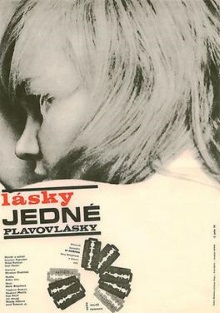
I usually like to let a bit of time pass before I watch two films by the same director but this one was added to the list quite some time ago and I didn’t quite realize that it had the same director as One Flew Over the Cuckoo’s Nest. This was made before Miloš Forman moved from his native Czechoslovakia to Hollywood and is in fact his first film. It is apparently considered an important film of the so-called Czech New Wave.
Under the Communist regime, the industrial town of Zruc is dominated by a single shoe factory in which most of the workers are women. This leads to the women greatly outnumbering mean in the town. The manager therefore arranges to have the army hold maneuvers nearby and host a soirée for the soldiers, hoping that this will help raise the morale of the female workers. A young woman Andula and her friends are among these workers. Though she already has a boyfriend, he is frequently absent. The soldiers however turn out to be mostly middle-aged, balding and overweight reservists, many of whom are already married. This doesn’t prevent one such group of four soldiers being more interested in Andula and her friends even though the women of their age would clearly more welcome their attentions. The girls reluctantly drink with the men but Andula herself is more attracted to the handsome young pianist who has come from Prague to play at the dance.
As is often the case with these small European films, it wasn’t obvious at the beginning what the film is about or even who the main characters are. The at times documentary-style filmmaking makes things even more confusing. Often it feels like nothing so much as a study in awkwardness as the hapless soldiers order a bottle of wine for the young girls only for the waiter to mistakenly deliver it to a group of middle-aged women for example. I had some good chuckles out of such scenes but I definitely did not expect it to be considered a comedy. I do suppose it could be considered black comedy but it’s depressing to make light of such sadness and that it counts as such in Czechoslovakia makes for a searing indictment of their society.
On the face of it, the themes seem common enough. Married, middle-aged men who are interested in young girls only for sex, a naive young girl who falls for a dashing young man from out of town, the anxiety of a mother who fears that her son has gotten himself entrapped by the wrong sort of girl and so on. But as usual the execution makes all the differences and the particularities of concretely setting this in Czechoslovakia under Communist-rule gives it extra poignancy. There’s something profoundly sad about a hall full of middle-aged women desperately hoping that one of the soldiers would pay attention to them and at least part of that is attributable to an oversight of state-planning that resulted in a town with such an imbalanced population. Then there’s the fact that the film was made during the brief period when the authorities had relaxed their hold over what sort of art could be allowed to be made. You can see in this a kind of longing for a bourgeois life of music, art and individual happiness even as the girls work in a single giant factory and are crowded into dormitories.
This film was a hit when it was released but dismayed both the authorities and the managers of the real shoe factory which allowed them to film there. But predictably enough it did cause a lot of young men to go to the town in hopes of getting a girl. In any case, I would rank this a modestly made film that punches way above its weight class. It’s a story of a single young girl that is at the same time representative of the society as a whole, neatly capturing the zeitgeist of the period. It makes you feel like laughing and crying at the same time. In short, it is truly great and it makes me feel a little sad that Forman made so few films in his native country before moving to Hollywood.